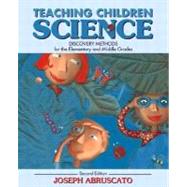
Note: Supplemental materials are not guaranteed with Rental or Used book purchases.
Purchase Benefits
What is included with this book?
All chapters include “Real Teachers Talking,” “Make the Case,” and “Internet Resources” and end with “Summary,” “Going Further,” “Notes,” and “Suggested Readings.”
Preface.
I. WELCOME TO DISCOVERY METHODS FOR THE ELEMENTARY AND MIDDLE GRADES.
1. Science and Technology: What Are Science and Technology? Why Teach Them?
You, Children, and Science: Some Hopes, Some Fears, Some Dreams.
What Is Science?
What Is Technology?
Why Teach Children About Science and Technology?
What Is Discovery Learning?
The Scientist: Who Is She?
2. Learning Science: How Can I Use Key Ideas from Learning Theory to Create a Discovery-Based Classroom?
Are You Learning Now?
The Classic Learning Theories.
Gardner's Multiple Intelligences.
Constructivism.
Learning Styles.
3. Science Process Skills: How Can I Use the Science Process Skills as Starting Points for Discovery-Based Units and Lesson Plans?
Discovery Learning.
The Science Process Skills: Individual Descriptions with Classroom Examples.
4. Planning and Managing: How Can I Plan and Manage Discovery-Based Units and Lessons?
The Water Rat and the Sea Horse.
The Scope of the Science Curriculum.
The Sequence of the Science Curriculum.
Unit Planning.
Lesson Planning.
Classroom Organization and Management for Discovery Learning.
5. Strategies for Discovery Learning: How Can I Use Cooperative Learning, Special Questioning, Active Listening, and Other Strategies to Foster Discovery Learning?
The Problem with Talk.
Cooperative Learning Strategies.
Questioning Strategies.
Active Listening Strategies.
Demonstrations.
Science Textbooks.
6. Assessment for Understanding and Inquiry: How Can I Move Toward Using Authentic Assessment and the Assessment Recommendations of the NSE Standards?
“What D'ja Git?”
Traditional Assessment, Authentic Assessment, and the NSE Standards Approach.
Traditional Assessment Techniques.
Authentic Assessment Techniques.
The NSE Standards Recommendations for Assessing Understanding and Inquiry.
7. Integrating Science: How Can I Integrate Science with Other Subjects During the School Day?
Making Connections.
Science and the Language Arts.
Science and Mathematics.
Science and the Social Studies.
Science and Art.
Science and Music.
Science and Health and Physical Education.
8. Science WebQuests: How Can I Plan and Manage Discovery-Based Projects for My Plugged-in Classroom?
A Strange Thing Happened on My Way to School One Day.
What Is a Science WebQuest?
How to Plan and Prepare a Science WebQuest.
9. Adapting the Science Curriculum: How Can I Adapt the Science Curriculum for Children from Diverse Cultural Backgrounds, Children with Special Needs, and Children with Special Gifts and Talents?
Treasuring the Fleeting Moments.
Children from Diverse Cultural Backgrounds.
Children with Special Needs.
Children with Special Gifts and Talents.
For the Teacher's Desk.
Your Classroom Enrichment Handbook.
Your Science Source Address Book.
Appendix: The National Science Education (NSE) Content Standards, Grades K-8.
Index.
The New copy of this book will include any supplemental materials advertised. Please check the title of the book to determine if it should include any access cards, study guides, lab manuals, CDs, etc.
The Used, Rental and eBook copies of this book are not guaranteed to include any supplemental materials. Typically, only the book itself is included. This is true even if the title states it includes any access cards, study guides, lab manuals, CDs, etc.